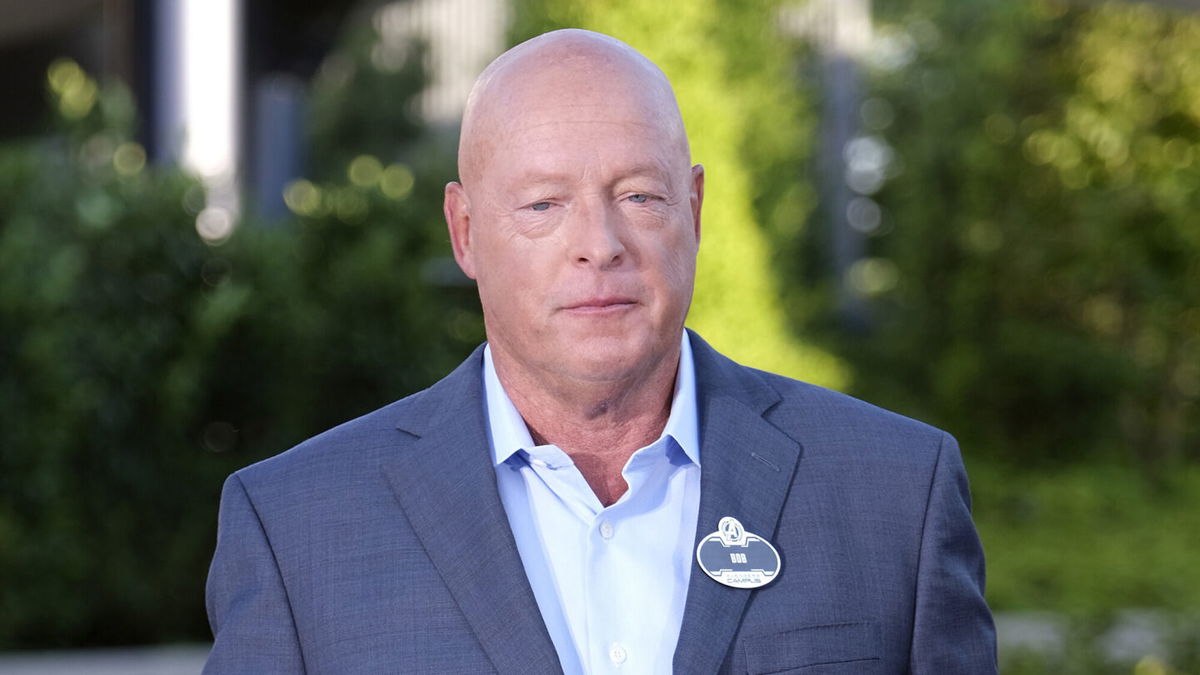Bob Chapek’s tenure marked by political missteps inside and outside of Disney

Bob Chapek attends Marvel Avengers Campus opening ceremony at Disneyland Paris on July 9 in Paris
By Ramishah Maruf, CNN
Bob Chapek was initially silent on Florida’s controversial bill barring discussions of gender identity in school classrooms. Now he’s saying “Goodbye, Disney.”
Chapek’s rocky two-and-a-half year tenure at the head of the entertainment giant had a few wins. He navigated the Covid-19 pandemic, which shuttered theme parks around the world and halted film production, grew Disney+’s subscriber base and held his ground against an activist investor.
But Disney made the surprise announcement Sunday that its revered former CEO Bob Iger is making a return as the head of the company.
Chapek, who served as chairman of Disney Parks, Experiences and Products before taking over for Iger, will be stepping down immediately.
Why? Chapek’s downfall arose, at least in part, out of his bungled response to Florida’s controversial Parental Rights in Education bill, dubbed the “Don’t Say Gay” bill by critics. His decisions had far-reaching effects on both Disney’s reputation and on the company’s “favored nation” status in the state.
Early this year, Disney faced mounting criticism for not taking a public stance on the bill. The law bans educators from discussions about sexual orientation and gender identity in some classrooms.
Chapek ended up igniting a political firestorm — despite his initial efforts to keep the company out of politics. (Iger had publicly condemned the bill on Twitter).
Lackluster response
Chapek addressed the issue in an email to staff but refused to issue a public statement against it in March. He defended that decision saying corporate statements “do very little to change outcomes or minds” and can undermine “more effective ways” of implementing change.
Chapek’s response marked a change in tone for Disney, which had previously been led by an outspoken CEO who had famously considered running for president.
The backlash was immediate, both within the company and in the public. Disney employees began staging walkouts, saying Chapek’s statements “utterly failed” to grasp the threat to LGBTQ communities.
Later that same week, Chapek apologized for his public silence on the bill. In a letter to employees, the CEO said the issue was not just about “a bill in Florida, but instead yet another challenge to basic human rights …You needed me to be a stronger ally in the fight for equal rights and I let you down. I am sorry.”
An apology too late
Chapek’s attempt to keep Disney out of politics quickly backfired. While the company began bracing for further walkouts and protests from progressives, Chapek’s eventual response led to a full blown battle between two Florida giants: the Walt Disney Company and the state’s Republican governor, Ron Desantis.
DeSantis quickly ripped Disney after Chapek’s public condemnation, calling the company a “woke corporation” with questionable business interests in China during a private event.
Disney is the main driver of Florida’s massive tourism industry and the state’s largest private employer. Before the public condemnation, Chapek told shareholders he had called Desantis to express his “disappointment and concern.”
He also announced a pause in political contributions in Florida (the company had previously donated $50,000 to DeSantis’ bid for reelection).
The feud eventually led to the Florida legislature revoking Disney’s special status to operate as an independent quasi-government around its Orlando-area theme parks.
The bill states the special designation, which also gives Disney significant tax advantages, won’t dissolve until June 2023. The Reedy Creek Improvement District, the entity that manages the Disney properties, argued it can’t be dissolved until Florida pays off its bond debts, essentially saying the special district can continue to operate as normal.
Iger vs Chapek
The fallout over the LGBTQ legislation created a rift between Iger and Chapek. CNBC reported that several Disney employees called Iger “to express their disappointment in Chapek.”
In June, it seemed that Chapek wasn’t going anywhere despite the public missteps — Disney announced a three year contract extension that would run into 2025.
“Disney was dealt a tough hand by the pandemic, yet with Bob [Chapek] at the helm, our businesses — from parks to streaming — not only weathered the storm, but emerged in a position of strength,” Disney board chair Susan Arnold said in a statement, adding he was the “right leader at the right time.”
Despite the public controversies and feuds, Chapek was dealt a lifeline with Disney+. The service’s subscriptions skyrocketed during the pandemic, and totaled more than 137 million at the time of Chapek’s contract extension.
But now economic uncertainty is looming over corporate America, and Chapek recently announced a hiring freeze and job cuts to manage costs, Reuters reported.
Streaming success wasn’t enough to save Chapek’s tenure or his reputation, as the company lost $1.5 billion in the fourth quarter.
Investors celebrated Iger’s return as CEO, sending Disney shares up nearly 7% Monday after dropping roughly 38% this year.
— CNN’s Frank Pallotta, Steve Contorno, Jamiel Lynch, Chris Boyette and Eric Levenson contributed to this report.
The-CNN-Wire
™ & © 2022 Cable News Network, Inc., a Warner Bros. Discovery Company. All rights reserved.